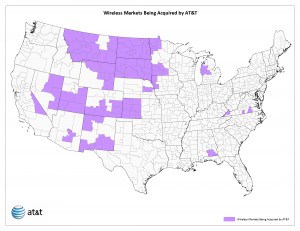When Verizon Wireless won approval of its takeover deal with formerly-independent wireless carrier Alltel, the federal government required Verizon to divest itself of Alltel’s assets in areas where the combined company would have a mega-share of the local wireless market. The majority of affected customers, particularly in Montana and the Dakotas, were eventually acquired by AT&T, which uses a completely different network standard. Customers were handed new phones that work on AT&T’s GSM network, but have since discovered those phones have little use in wide areas where AT&T simply doesn’t deliver a signal.
Even worse, Verizon’s robust network across the region is off-limits for roaming purposes, forcing customers that were perfectly satisfied with Alltel ready to throw their AT&T phones off Mount Rushmore.
“We got stuck with AT&T, which doesn’t care about the rural areas,” Mark Freeman of Harlowtown, Montana told a visiting reporter with the Wall Street Journal.
In the Black Hills, where AT&T’s network is as spartan as the landscape, some customers waited months before they could actually make and receive phone calls in places where Alltel’s old network (and their roaming agreement with Verizon Wireless) suited local residents just fine.
“We’ve been getting dropped calls, missed calls, and [have trouble] servicing [ATM] machines,” said Bill Huffman, an armored car worker in Sioux Falls frustrated by AT&T. Area ATM machines depend on AT&T’s wireless network to alert drivers when local cash machines run low. But AT&T’s network isn’t dependable, according to Huffman.
Ironically, customers are flocking to the carrier that would have been their new provider to begin with if not for the federal government divestiture order: Verizon Wireless.
[flv width=”512″ height=”308″]http://www.phillipdampier.com/video/WSJ In South Dakota Dropped Calls and Dead Spots 11-27-11.flv[/flv]
Verizon Wireless stores in the region have suffered periodic equipment shortages ever since AT&T switched on their own, less satisfactory network. That’s because AT&T customers are dropping their contracts at a rate rivaling the number of calls AT&T itself drops across the region. The Wall Street Journal visits with perturbed local residents in Montana and South Dakota. (4 minutes)


 Subscribe
Subscribe

Sounds like the government found that Alltel and Verizon had virtually all of the customers in that area and thought the market would be competitive if they forced those customers to switch to AT&T. The feds never considered there might be a *reason* that AT&T didn’t have many customers in the area.
They could have at least let customers decide which company they were going to switch to, I hope AT&T doesn’t get to charge them ETFs for breaking a contract that the customer never agreed to.
Alltel back in the day was AWESOME! I live in a trailer home no other cell service would reach into my home, but with Alltel, no problem! Great reception inside and out! Yep, no antenna booster needed. Then VZW bought Alltel, and man did it ever go downhill fast. Reception started getting spotty, dropped calls every time, no good! After 5 years with Alltel aka Verizon, I cancelled them 3 years ago and vied for a pre-paid phone that is with Sprint. Sure, I had OK reception, not great but nothing can replace the good ol’ cell phone days of… Read more »